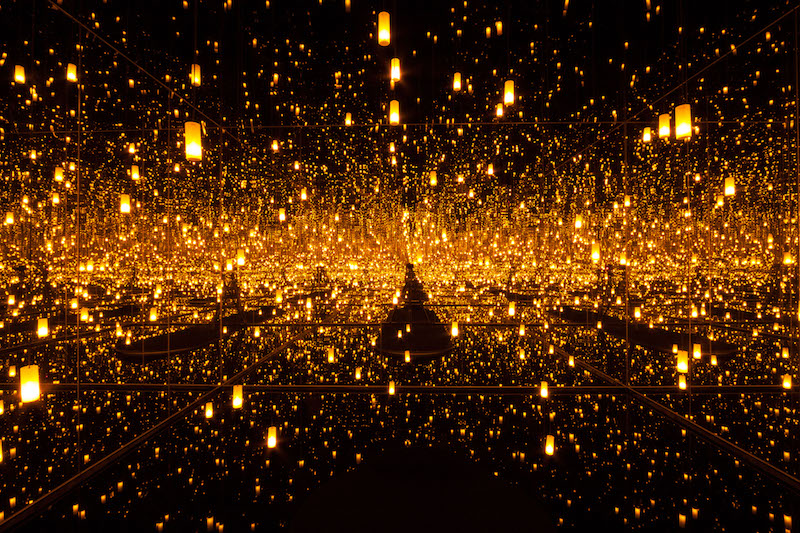Why Yayoi Kusama Matters Especially In The Age Of Digital Narcissism

I wonder many things like who decides whose art has value and what the requirements are. Art is subjective, this we know, but art is also political. Case in point why Yayoi Kusama failed to receive notoriety early in her career like her male counterparts. She would eventually move back to Japan where she dealt with depression leading to psychiatric help. A story that hits home.
“I am deeply interested in trying to understand the relationship between people, society, and nature; and my work is forged from accumulations of these frictions,” Kusama was quoted throughout the walls of her new exhibit at the Bellagio Gallery of Fine Art starting now through Sunday, April 28, 2019.
To see her work displayed in such a gallery, knowing her story, was an emotional experience because I identify. In fact, her story is a narrative most of us have ascribed to by natural and political law.

Because I also wondered, “why, of all her installations, were these two installations chosen to exhibit together?” The narcissism in the 60s has clearly amplified since the rise of the digital state we’re in; constantly being seduced by our appearance and the apps that allow us to enhance our looks while completely living with rose colored glasses when there are fires in our society that we need to, metaphorically and literally, put out? (Yes, Kusama. I feel you sister!)
What you can expect from the Narcissus Garden experience are reflective steel spheres occupying half of the Bellagio Gallery of Fine Art gallery spread throughout its floor corner-to-corner. What you will see, is for you to experience.
And to give you a backstory, the original spheres were made of plastic as later cited in her autobiography. Narcissus Garden was originally exhibited in 1966 at Venice Biennale by Kusama, which according to her autobiography was commissioned to produce by Biennale. She began to sell her 1,500 spheres for $2 each with a sign that read “Yayoi Kusama. Your narcissism for sale [sic].” Eventually, Biennale staff ended her “peddling.” Her installation, her attire deliberately included, and performance art garnered her international press.

Much like the intention behind Narcissus Garden to force people into seeing themselves, Aftermath of Obliteration of Eternity is an imaginative installation with shimmering lights and mirrors reflecting your silhouette back at you by way of infinity mirrors. The intention is geared more importantly towards how you occupy space albeit the unverise you live in (be sure to keep in mind that you’ll be there for about 60-seconds so figure out what you want to do with your phone should you feel so included to partake in the narcissism.) It also evokes wonderment that feeling that only awe can evoke. That part where I mentioned that shows us what’s worth living for– perspective if you will. Childhood memories, like the scene from Peter Pan flying over Wendy’s town towards Neverland, might also awake from your subconscious.
Ironically enough, the intention behind both Narcissus Garden and Aftermath of Obliteration of Eternity are profoundly amplified because we are in the selfie era. The urge to take selfies and uploads to your social media audience will not escape you. I am sorry, but it won’t. I, who loathes narcissism, fell trap to this. An example that the seduction of narcissism alarmingly plaguing today’s 21st-century inhabitants is mad real.
It’s more important to note that where we were 50-years ago and where we stand right now is why Yayoi Kusama matters to our today’s narcissistic, anxiety, and politically driven society. This exhibit is Bellagio Gallery of Fine Art’s most relevant and relatable exhibit to date, and a narrative we desperately need more of. I have no doubt that we’ll see more of this because I’m filled with joy to know that the executive director behind the Bellagio Gallery of Fine Art is Tarissa Tiberti. Yes. A badass woman.
Tickets can be purchased through Bellagio's website or in-person at only $13 for locals with valid ID or $15. Free for children ages 12 and under.
Press Play: Yayoi Kusama Obsessed With Polka Dots
Photo Courtesy: Ota Fine Arts,





